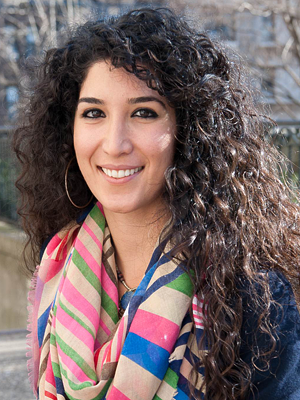PhD Student Wins Fulbright to Tackle Flood Management in Haiti
Raha Hakimdavar, a second-year PhD candidate in civil engineering and engineering mechanics, has won a Fulbright research grant to further study and develop a sensor- and satellite-driven network for flood management in areas with high flood risk. Sponsored by the Netherlands America Foundation (NAF), a bilateral group that supports educational, cultural, and business exchange between the Netherlands and the United States, this Fulbright award will fund Hakimdavar’s ongoing flood management research focused on the southwestern coast of Haiti.

Raha Hakimdavar has found that engineering gives her "the potential for transforming my abstract ideas of change and progress into realities."
For Hakimdavar, who actually wanted to be a journalist before she ultimately found her way to engineering, winning the Fulbright grant is a great honor. “But more than that, it feels wonderful to have somebody believe in your ideas and potential enough to invest in you,” she says. “I feel very fortunate for the opportunity because not only do I get to expand my knowledge on work that I’m very passionate about, I also get to experience something entirely new in my life.”
Southwest Haiti in particular poses numerous challenges with respect to flood management, explains Hakimdavar, because of its extreme deforestation, soil degradation from poor agricultural practices, high urbanization rate, and susceptibility to extreme climate and climate change. With the Fulbright award, Hakimdavar will conduct studies in the Netherlands—a nation that has a long history with flood management and where researchers have already made headway in developing successful approaches to understanding and mitigating flood risks in the country. She will apply what she learns from this research to her work in Haiti.
Over the past year, Hakimdavar has worked with a team of Columbia scientists alongside Haitian collaborators to implement an environmental monitoring program for several watersheds in southwest Haiti, delivering remotely accessible real-time water and climate information. She will continue this line of research in September 2013 through May of next year at Delft University’s (TU Delft) Research Initiative Environment in the Netherlands, further investigating environmental management in developing and/or data-poor regions. She plans to work with TU Delft researchers to develop new methods of obtaining environmental data in Haiti with measuring devices like in-situ sensors and satellites, and using them to assess flood risks in the region.
As a student in Columbia Engineering’s Integrative Graduate Education and Research Training (IGERT) Program, “Solving Urbanization Challenges by Design,” Hakimdavar has worked with some of the leading experts in the field, including advisors Patricia Culligan (Columbia Engineering), Wade McGillis (Lamont-Doherty Earth Observatory), and Elliott Sclar (Graduate School of Architecture, Planning, and Preservation).
“Raha is very entrepreneurial and easily makes connections across disciplines. She is definitely an ambassador for interdisciplinary PhD training, and has already made unique contributions in water resource management,” says Culligan, professor of civil engineering and engineering mechanics. “It's great that she has been recognized by a Fulbright. We are all really proud to be associated with her.”
Born in Iran but primarily raised in Southern California, Hakimdavar came to Columbia Engineering because of its holistic approach to engineering research, which she says, “oftentimes challenges discipline boundaries.” Her interest in water and the environment started early. “I used to collect rainwater in special jugs for years, carefully noting differences between seasons and locations,” she recalls. “I was really mesmerized by the phenomenon of rain. It occurred to me towards the end of my master’s degree that I’m now, so many years later, doing almost exactly the same thing, just using more sophisticated jugs.”
